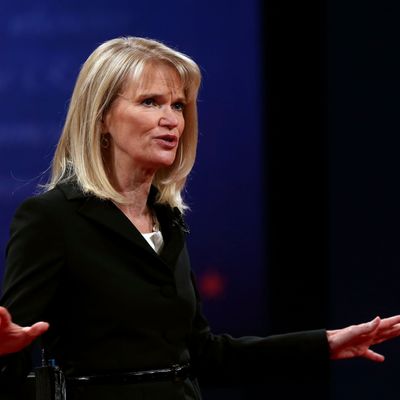
As Thursday night’s vice-presidential debate came to a close, commentators divided on which of the candidates should be declared the winner. Joe Biden and Paul Ryan had different objectives; neither is at the top of the ticket. But there was widespread agreement about another unspoken matchup: Martha Raddatz had absolutely crushed last week’s moderator, Jim Lehrer.
Where Lehrer sat there like a slowly blinking bump,* Raddatz was firm but fair with the VP candidates. Where Lehrer asked softball questions like a college admissions counselor, Raddatz went with specific lines of inquiry that exposed each candidate’s weaknesses and the differences between them. The public — well, at least the social-media-using public — praised her for it.
The rave reviews that Raddatz is earning (well, from everyone but the Sean Hannitys of the world) are doubly impressive given the instinctive negative reaction most have to a woman who tells other people when it’s time to be quiet and when they have permission to talk. To say that women who occupy these positions are not instantly likable is a dramatic understatement; the less a newscaster resembles the white male Walter Cronkite ideal, the more anxiety she seems to cause. When journalist Renee Ferguson appeared on-camera sporting an Afro, her bosses asked her to change her hairstyle: “We’re getting a lot of calls from our viewers,” they told her. “They say you look militant, like Angela Davis. You’re scaring them!” And that was just her physical appearance. Doesn’t leave a lot of opportunity to ask the tough questions.
We’re raised with stereotypes about ball-busters, led to believe it’s unfeminine to dominate a conversation. So even if a thick-skinned, assertive woman knows it’s her right — her job, even! — to interrupt, it can be tough. As moderator of the 2004 and 2008 vice-presidential debates, Gwen Ifill wasn’t quite as passive as Lehrer last week, but she was by no means aggressive. (She was also, in 2008, dealing with charges of bias because she was working on a book about Obama at the time.) In both of those election cycles, Ifill was the only woman to moderate a debate. In 2000, every debate was moderated by a male journalist.
Some of this gender disparity, I think, has to do with how women age in broadcast media. Like it or not, prestigious jobs such as moderating presidential debates are reserved for the most seasoned veterans. And once they hit a certain age, many women are nudged off-camera. A BBC anchor named Miriam O’Reilly filed a suit alleging she was fired because she was aging. O’Reilly, then 53, says a program director told her, “You’re going to have to be careful about those wrinkles when high-definition [television] comes in.” Of course, it’s probably not quite that straightforward in most cases. But both because of age discrimination now and more rampant sex discrimination in earlier decades, it’s not crazy to assume that there’s a fairly small pool of women to pick from — to say nothing of the paucity of non-white journalists who meet the “seasoned veteran” criteria that the Commission on Presidential Debates employs.
Next week’s debate will be hosted by CNN’s Candy Crowley. It’s a town hall, which means citizens are asking questions, not the moderator. But Crowley will still have plenty of opportunities to keep the candidates in check and the conversation on track. Here’s hoping she lives up to Raddatz’s example.
*This article incorrectly reported that Romney used up more than his share of the presidential debate’s answer time; in fact, Obama used four more minutes.




